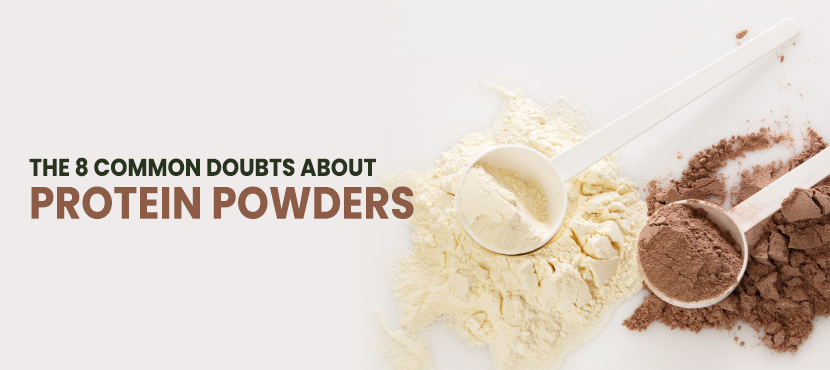The 8 Common Doubts about Protein Powders
Let’s put it straight; here are the 8 frequent and popular doubts raised by people when it comes to protein powders.
- What are the various forms or types of protein powders available?
So, there are 8 quite famous forms or types of protein powders:
- Whey protein
- Casein protein
- Egg proteins
- Peanut protein
- Soya protein
- Hemp protein
- Mix plant proteins
- Brown rice protein
And a few among these are also a mixture of complex proteins and carbohydrates.
- Who will require protein powders?
The intake of protein powder is a must for the following groups of individuals:
- Vegetarians, whose diet will predominantly be carbohydrates; rice, wheat, to name a few. And these foods are majorly deficient in proteins.
- Growing kids who are actively involved in any sports activities.
- Individuals who usually take up regular weight training programs.
- Those who wish to lose some fat (i.e weight loss).
- Athletes and bodybuilders who require protein intake a bit higher than the then general population.
- What should be the protein requirement per day?
It is recommended that over 60 grams of protein (average) should be your protein requirement per day. But for people much involved in sports, athletics, and bodybuilding, it must be around 1.2x to 1.6x grams of protein per KG of their total body weight.
- When and how much of the protein powders have to be consumed?
Strict vegetarians may consume around 2 to 3 spoons of the protein powder, along with their breakfast. Based on a research study, it is proven that consuming around 30 grams of protein with your breakfast is ideal for maintaining optimal health and even for aiding your weight loss effectively. Also, you must take around 30 grams of protein (after your workout), i.e. approximately 1 heaped scoop of whey protein, if you do:
- Heavy workouts.
- Resistance training.
- Martial arts.
20 grams of protein is ideal for the ones who only perform cardio-based exercises. A study also shows that around 20 to 30 grams of protein consumption will be necessary, as per the total intensity of the workout; this is to repair the damaged muscle fibres and help in the formation of new muscle synthesis.
Remember to take around 25% to 30% of protein foods along with each meal!
- Which protein powder is the best one for fitness and weight loss?
For weight loss, casein protein, whey protein, or a combination of both is suitable. This is specifically helpful to burn more calories and boost the basal metabolism of your body.
- Can protein powders cause kidney or liver damage?
No research has proven that protein powders trigger and damage the kidneys or live of healthy individuals.
Additionally, a detailed review of several studies on the effect of protein on the kidney and liver of normal people, highlight the fact that there is still no proper evidence to limit protein intake. Moreover, patients affected by chronic liver disease, cirrhosis, for example, are usually advised to have a high protein diet. This is done to avoid tissue wastage.
Just note that there is a piece of evidence that points out that a high protein diet without the clinical recommendation of any dietician in Bangalore can indeed be harmful to individuals affected with kidney disease!
- Which is the best protein powder?
‘Whey protein’ is the best known and the most popular protein powder that you can try.
- Is protein powder intake compulsory for all of us?
Nope. If you are already consuming a sufficient (meaning optimum) quantity of high protein foods, then protein powders are not mandatory for you.
And keep in mind that you must go with authentic protein brands only from the market. Choose them by checking the reviews of customers and other opinion pieces of wellness experts, qualified clinicians, and even get recommendations from any experienced fitness specialist before you do the purchase.





No Comments